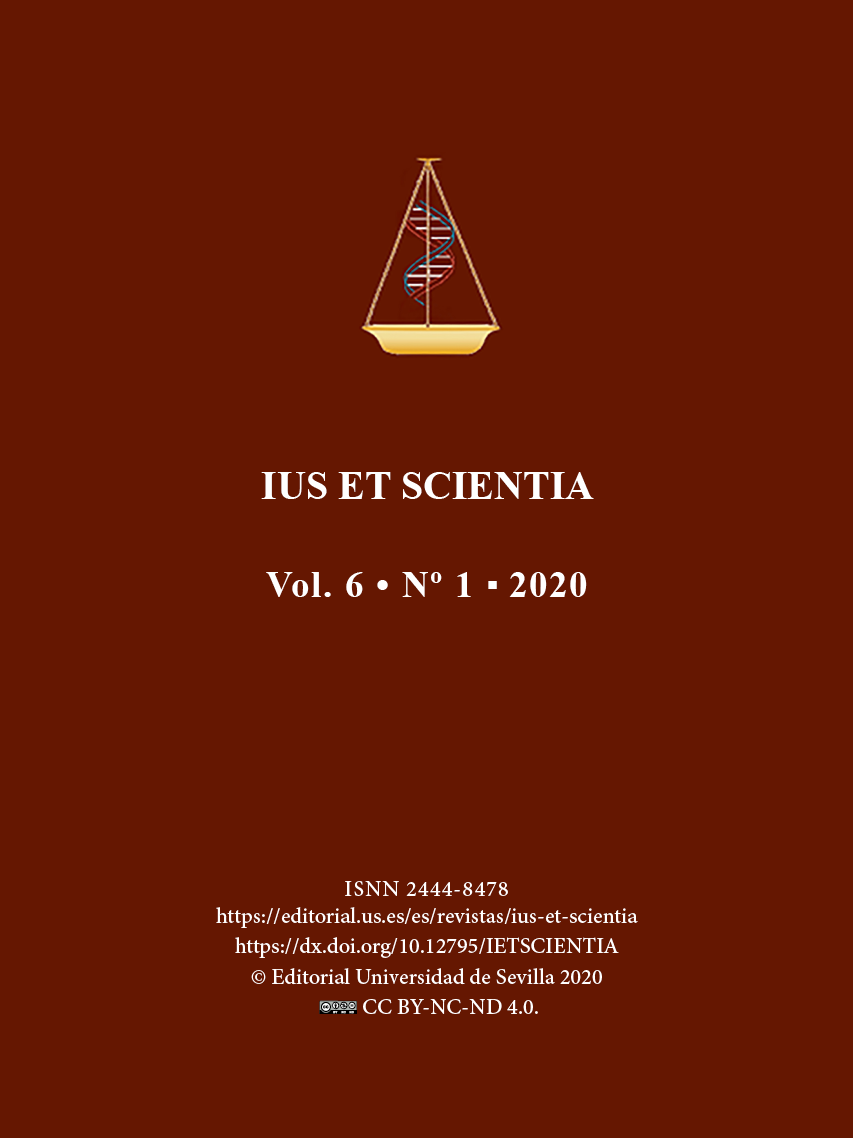Right to memory. Towards an ethics of memory in the search of our disappeared
DOI:
https://doi.org/10.12795/IESTSCIENTIA.2020.i01.07Keywords:
Search, Disappeared, Ethics, MemoryAbstract
The purpose of this work is to share some reflections from the ethics in front of the victims and from the Mexican experience around the scope and limits in the implementation of strategies that are used by the Mexican State regarding the disappearance of people in Mexico. These reflections are based on the analysis of some figures and other data derived from constant events that have attracted the attention of international human rights institutions. It is concluded that, despite the efforts of the Mexican government in this delicate matter, it has been the civil organizations, instituted in our moral reserve against the phenomenon, who have really contributed in a substantive and operational way in the search for the disappeared.
Downloads
References
BAUMAN, Z. Ética posmoderna, Siglo XXI, Ciudad de México, 2005.
BONILLA, M. “Desaparecidos. Guerra sucia deja 480 víctimas”, en El Universal, (Agosto 16 de 2015). Disponible en: https://www.eluniversal.com.mx/articulo/estados/2015/08/16/desaparecidos-guerra-sucia-deja-480-victimas. Fecha de consulta: 10 de diciembre de 2019.
CERUTTI, M. “La memoria de las víctimas. Testimonios para una reflexión ética”, en MARDONES, J. M. y MATE, R. (ed.). La ética ante las víctimas, Anthropos, Barcelona, 2003.
CORTINA, A. Alianza y contrato. Política, ética y religión, 2ª ed., Trotta, Madrid, 2005.
ESPOSITO, R. Personas, cosas, cuerpos, Trotta, Madrid, 2017.
FAJARDO MORALES, Z. A. El control difuso de convencionalidad en México: elementos dogmáticos para una aplicación práctica [Documento inédito]. Disponible en: http://www.sitios.scjn.gob.mx/reformasconstitucionales/sites/default/files/material_lectura/Fajardo%20Control%20Convencionalidad.pdf. Fecha de consulta: 08/03/2015.
FOWKS, J. “Una prenda de vestir como último vestigio para reconocer un cadáver”, en El País (Septiembre 21 de 2014).
LE BRETON, D. La sociología del cuerpo, Nueva Visión, Buenos Aires, 2002.
LÓPEZ MERINO, M. J. “El desaparecido como sujeto político: una lectura desde Arendt”, en Franciscanum, vol. LVII, núm. 164, julio-diciembre, 2015, pp. 67-95. Disponible en: http://www.redalyc.org/articulo.oa?id=343540286004
MATE, R. “¿Pero quiénes son las víctimas?”, en El País. (Enero 18 de 2001).
ORDAZ, P. “Detenido un sicario mexicano que disolvió 300 cuerpos en sosa cáustica”, El País. (Enero 25 de 2009).
PAZ y PAZ, C. “Recomendaciones para mejorar el sistema de investigación criminal mexicano a la luz del caso Ayotzinapa”, en Aportes DPLF, Número 21, año 9, enero 2017, pp. 4-10.
PERASSO, V. “Una base de datos para buscar migrantes desaparecidos”, en BBC Mundo. (Mayo 21 de 2013).
PÉREZ TAPIAS, J. A. “Derechos humanos y ciudadanía democrática: la responsabilidad moral por los derechos del otro”, en HERRERA GUIDO, R. (coord.). Hacia una nueva ética, Siglo XXI, Ciudad de México, 2006.
RITTER, N. “Missing Persons and Unidentified Remains: The Nation’s Silent Mass Disaster”, en National Institute of Justice Journal, Issue No. 256, Washington DC, pp. 2 y ss. Disponible en: https://www.ncjrs.gov/pdffiles1/nij/jr000256.pdf
TAFALLA, M. “Recordar para no repetir: el nuevo imperativo categórico de T. W. Adorno”, en MARDONES, J. M. y MATE, R. (ed.). La ética ante las víctimas, Anthropos, Barcelona, 2003.
TURATI, M. “Destruye Segob bases de datos personales del Renaut”, en Proceso, No. 2053, (15 de junio de 2012). Recuperado de: http://www.proceso.com.mx/?p=311021
UNITED STATES. DEPARTAMENT OF STATE: Bureau of Democracy, Human Rights and Labor. México 2014: Human Rights Report. Disponible en: http://www.state.gov/documents/organization/236914.pdf
VALLADOLID BUENO, Tomás. “Los derechos de las víctimas”, en MARDONES, J. M. y MATE R. (ed.). La ética ante las víctimas, Anthropos, Barcelona, 2003.
Leyes
MÉXICO: Ley General de desaparición forzada de personas, desaparición cometida por particulares y del sistema Nacional de Búsqueda de personas, 2017.
MÉXICO: Convenio de colaboración en materia de búsqueda y localización de personas desaparecidas e identificación de cadáveres o restos humanos, 2018.
Tesis y jurisprudencias
Quinteros vs. Uruguay Comité de Derechos Humanos de la ONU, comunicación 107/1981 21 de julio de 1983, párrafo 14, cit. por Human Rights Watch Los desaparecidos en México.
Tesis Aislada del P. LXVI/2011 (9a.), No. de Registro No. 160584. Época: Novena Época, Registro: 162612, Instancia: Tribunales Colegiados de Circuito, Tipo de Tesis: Aislada, Fuente: Semanario Judicial de la Federación y su Gaceta, Tomo XXXIII, Marzo de 2011, Materia(s): Civil, Tesis: I.8o.C.301 C, Página: 2301.
Internet
http://www.mexicodenuncia.org/?page_id=31 al año 2009
http://www.unesco.org/culture/ich/es/RL/00054
http://www.inegi.org.mx/prod_serv/contenidos/espanol/bvinegi/productos/censos/poblacion/2010/panora_religion/religiones_2010.pdf
http://www.eluniversal.com.mx/primera/31613.html consultado el 02 de junio de 2014.
https://rnped.segob.gob.mx/
http://www.ceav.gob.mx/2015/08/acciones-a-seguir-ante-la-desaparicion-de-una-persona/
http://www.scielo.org.mx/pdf/amdi/v11/v11a18.pdf
https://www.gob.mx/sesnsp/acciones-y-programas/registro-nacional-de-datos-de-personas-extraviadas-o-desaparecidas-rnped.
https://datos.gob.mx/busca/dataset/estadistica-de-personas-desaparecidas-no-localizadas
http://www.bbc.com/mundo/noticias/2013/05/130520_base_de_datos_migrantes_desaparecidos_vp
https://www.proceso.com.mx/453902/ine-compartira-a-la-pgr-bases-datos-identificar-a-personas-desaparecidas.
Otros
Documento técnico para Extender invitación de Documento técnico para la audiencia temática: “Las desapariciones forzadas y la propuesta del Mecanismo Extraordinario de Identificación Forense en México”. (Documento web) 2019.https://sinlasfamiliasno.org/movimiento/wp-content/uploads/2019/05/MecanismoForenseCIDH2019.pdf. 9 septiembre de 2019.
Instrumento de aceptación depositado ante el Secretario General de la OEA el día 16 de diciembre de 1998 y publicada en el DOF el 24 de febrero de 1999.
Conferencia de prensa del día 11 de septiembre de 2008, disponible en http://www.eluniversal.com.mx/primera/31613.html consultado el 02 de junio de 2014.
Human Rights Watch. Los desaparecidos en México. El persistente costo de una crisis ignorada, EEUU, edición a cargo de Human Rights Watch, 2013. Véase especialmente el capítulo intitulado “El gobierno federal no crea bases de datos nacionales sobre personas desaparecidas y restos humanos no identificados”, pp. 130-138. Disponible en: https://www.hrw.org/sites/default/files/reports/mexico0213sp_ForUpload_0_0.pdf
Downloads
Published
How to Cite
Issue
Section
License
Those authors being published in this journal agree to the following terms:
- Authors retain their copyright and they will guarantee to the journal the right of first publication of their work, which will be simultaneously subject to license recognition by Creative Commons that allows others to share such work provided it is stated the author’s name and his first publishing in IUS ET SCIENTIA.
- Authors may take other non-exclusive distribution license agreements version of the published work (e.g. deposit in an institutional digital file or publish it in a monographic volume) provided it is stated the initial publication in this journal.
- It is allowed and encouraged that Author s disseminate their work via the Internet (e. g. institutional digital files or on their website) prior to and during the submission process, which can lead to interesting exchanges and to increase citation of the published work.
- Abstract 196
- PDF (Español (España)) 309





